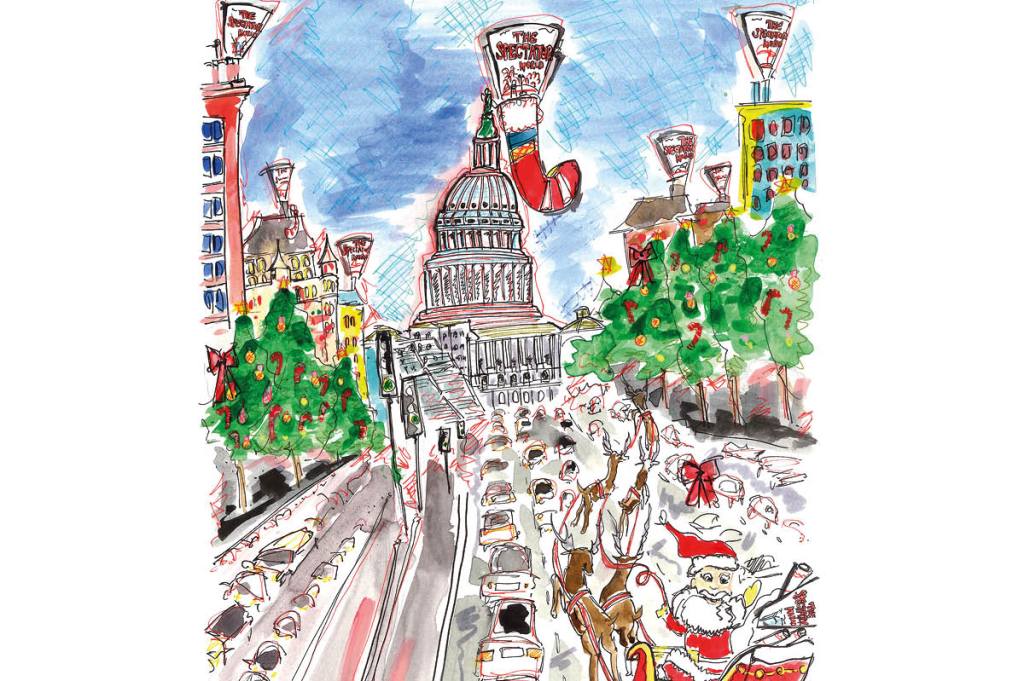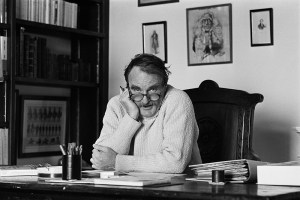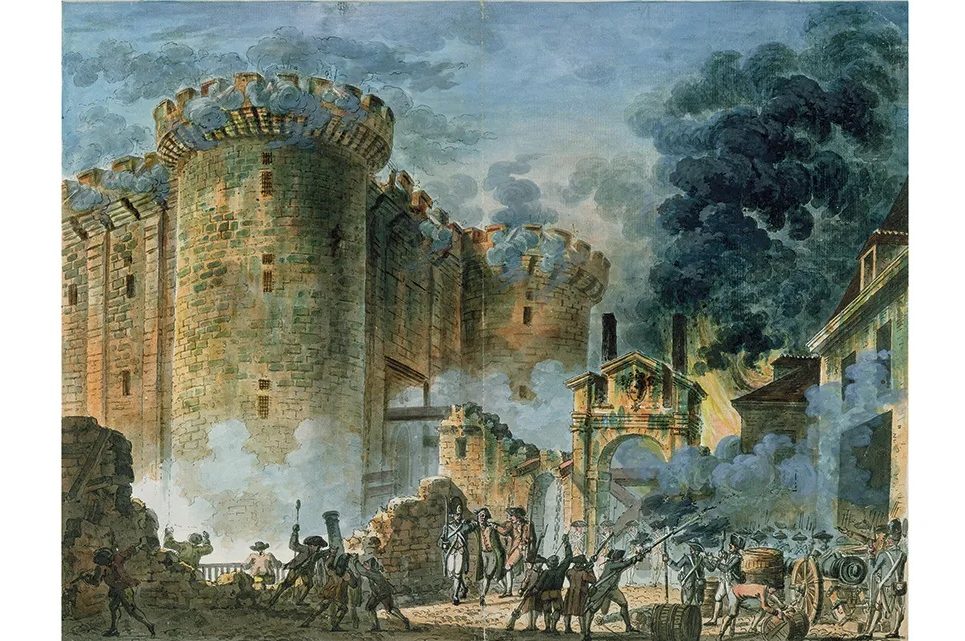Andrew Roberts
America’s Collection: The Art and Architecture of the Diplomatic Reception Rooms at the US Department of State (Rizzoli, $100) is beautifully written by the director and curator of the State Department’s truly extraordinary collection, Virginia B. Hart. It is a sumptuous volume chronicling the US government’s huge collection of American art, furniture, porcelain, maps, prints and drawings, compiled over a quarter of a millennium. Thirteen other writers and experts, including David M. Rubenstein, have also contributed to what is a genuinely remarkable as well as gorgeous-looking book.
James B. Conroy’s The Devils Will Get No Rest: FDR, Churchill, and the Plan That Won the War (Simon & Schuster, $34) is about the plan for victory drawn up by the British and Americans at the Casablanca Conference in January 1943. It was there that the decisions were taken to invade Sicily, ramp up the Combined Bomber Offensive, demand unconditional surrender from Nazi Germany and much more. Conroy is particularly good at showing the way that the fine personal chemistry between President Roosevelt and Winston Churchill helped their chiefs of staff to come to the world-changing conclusions that they did.
William Boyd
This year saw two fascinating books about spies who became novelists. Nicholas Shakespeare’s magisterial Ian Fleming: The Complete Man (HarperCollins, $35) will surely be the last word on James Bond’s creator. Shakespeare’s intimate grasp of Fleming’s social milieu makes this superb biography even more authoritative.
Adam Sisman has added a revelatory coda to his brilliant 2015 biography of John Le Carré in his book The Secret Life of John le Carré (HarperCollins, $28). Every dark and shameful secret le Carré wanted excluded from the account of his life is now posthumously exposed — but wth great tact and judiciousness. However, the perception of the man is now fundamentally changed.
Harry Mount
Thought you’d had your fill of Burton and Taylor? Well, you haven’t until you’ve gorged on Roger Lewis’s Erotic Vagrancy — Everything about Richard Burton and Elizabeth Taylor (Mobius, $28).
This is an epic biography that reinvents the form. It goes way beyond the chronological list of life events that so many biographies consist of.
Lewis — like Burton from South Wales — understands that world better than anyone, and also understands Burton’s desperation to leave the emptiness of Hollywood, filled with an ocean of booze. Lewis’s comic command of detail and gift for bathos show a rare gift: take his description of Elizabeth Taylor’s overnight visit to Burton’s family in Wales: “The lavvy was a tidy step, so Taylor was handed a personal pisspot.”
The Burton-Taylor story, for all its glamour, is tragic. As Burton’s sister Cis declared, “We all rue the day when he met Elizabeth.” And how good Lewis is on Burton’s loves — books and drink. Here is Burton on a martini: “double, ice cold, the glass fogged with condensation, straight up and then straight down and the warm flood of the painkiller hitting the stomach and then the brain and an hour of sweet melancholy euphoria.” How delicious!
Jacob Heilbrunn
The Washington Post may be too addled to review it, but Martin Peretz’s The Controversialist (Wicked Son, $28) is one of the most significant books of the past year. As publisher of the New Republic, Peretz was at the center of American political and cultural debates for fifty-some years. The Oxford don and wit Maurice Bowra, when queried how old someone was, liked to respond, “Our age.” Peretz’s elegantly conceived memoir very much has an “our age” feel to it — it’s a goldmine of information about Harvard, New York intellectuals and much else besides.
Derek Leebaert’s Unlikely Heroes: Franklin Roosevelt, His Four Lieutenants, and the World They Made (St. Martin’s Press, $35) offers a fascinating and detailed portrait of the Roosevelt era. And perhaps the most unexpected book I stumbled across explains how it all went wrong at the turn of the century — Harold Macmillan’s Winds of Change (Macmillan) whose accounts of World War One, Winston Churchill and David Lloyd George could hardly be more riveting.
Michael Bhaskar
Peter Turchin is one of the rare people to have (almost) single-handedly invented an entirely new discipline, in his case cliodynamics, or the application of dynamic-systems approaches to understanding society. His book End Times: Elites, Counter-Elites and the Path of Political Disintegration (Penguin, $28) shows what such an approach can deliver: a revelatory high-level sense of the world snapping into focus. You come away with a powerful, unforgettable new understanding of the subject. On the one hand it’s reassuring to have this kind of robust analysis; on the other, it’s terrifying what is likely in store.
2023 was India’s year coming out as an indisputably global power, and everyone would greatly benefit from Joya Chatterji’s kaleidoscopic, intimate yet epic history, Shadows at Noon: The South Asian Twentieth Century (Yale, $40). Immense and rich, it does full justice to the complexity of an endlessly fascinating and increasingly pivotal region.
David J. Garrow
My best book of 2023 is one I reviewed in these pages in May: Jonathan Eig’s King: A Life (Farrar, Straus and Giroux, $35), a worthy successor to my own Bearing the Cross and a strong contender for next spring’s Pulitzer Prize in biography.
I was likewise deeply impressed with Serhii Plokhy’s The Russo-Ukrainian War: The Return of History (Norton, $30) an authoritative introduction to the most important event of our lifetimes.
But by far the most powerful tome I perused this year is a privately published 640-page Report on the Biden Laptop, authoritatively compiled by Garrett Ziegler and available on the web from his 501(c)3, “Marco Polo.” It’s a transfixing window into the entire Biden family, and the scale of human depravity it relentlessly details is unforgettably disgusting.
Amanda Craig
Rose Tremain’s exquisitely-written Absolutely & Forever (Penguin, $26) has been called “the English Bonjour Tristesse.” In the late 1950s, fifteen-year-old Marianne falls desperately in love with eighteen-year-old Simon, whose brains and beauty suggest he is destined for success. He takes her virginity, fails to get into Oxford and leaves for Paris. Devastated, Marianne goes to London and, with the limited opportunities open to pretty upper-middle-class girls, encounters the start of the Swinging Sixties. Her wit and humor are matched by her conviction that she is ignorant and unworthy.
But this is not just a story of how first love can ruin a young woman’s life, or about the way Britain changed out of all recognition. It’s about friendship, loneliness, courage, a disastrous marriage and the way that daughters need to forgive their mothers. Tremain’s best novel since Music & Silence is ultimately about the forging of a future writer.
A nonfiction companion piece is Ysenda Maxtone Graham’s acutely funny book, Jobs for the Girls, (Abacus, $27) about how women from 1950-80 emerged into the workplace to freedom, inequality, enjoyment and remarks like “you’re perfectly bed-worthy, you won’t need to work.” A sharp-eyed and sharper-eared social historian, the author reminds us of the way we live now by chronicling how much we have changed.
Anne Sebba
Two Roads Home: Hitler, Stalin and the Miraculous Survival of My Family by Daniel Finkelstein (Knopf Doubleday, $33) is an extraordinarily powerful and moving book, which is both an unremitting chronicle of suffering and torture, and uplifting in the way it reveals the human will to survive unimaginable hardship. The subtitle does not do justice to the depth of the story since it is, of course, about much more than one family. But, thanks to Finkelstein’s skill as a storyteller, it always has the family at its heart and is, despite the somber subject matter, immensely readable. This should be compulsory reading for anyone who wants to try to understand the dark twentieth century; it reminds us that murderous depravity was not the preserve of Nazism alone but rivaled — and sometimes surpassed — by Stalinism.
By contrast The Second Sight of Zachary Cloudesley (Doubleday, $28), the debut novel of Sean Lusk, is a deep dive into the world of eighteenth-century clockmakers and the vogue for automata, the Ottoman Court in Constantinople, a relationship between father and son and the wonderful character of Great-Aunt Frances, radical thinker and keeper of the largest owl collection in England. If you want a fast-paced journey into the past with a brilliant guide, then try this. I loved it.
Mitchell Jackson
On its surface, Jake S. Friedman’s The Disney Revolt: The Great Labor War of Animation’s Golden Age (Chicago Review Press, $30) seems contemporary because of 2023’s endless Hollywood strikes — it’s the first full-length history of the 1941 strike at the Walt Disney Studio — but it’s current for another reason: it perfectly captures how cancel culture works and why its practitioners weaponize it. For his part, Walt Disney smeared some of his striking employees as communists and later testified at Senator Joe McCarthy’s HUAC hearings. The strikers got their vengeance, though. Strike organizer and legendary animator Art Babbitt libeled Disney as an antisemite, a false allegation that continues to this day. The Disney Revolt reveals that both liberals and conservatives cancel their opponents. Friedman doesn’t offer a solution; however, understanding why and how it comes to pass is pivotal to destroying this vile culture.
John R. MacArthur
Tim O’Brien’s America Fantastica (Mariner, $32) appeared on my radar just as I despaired of recommending a contemporary novel to an anxious young graduate student who asked me what he should read by a living author. Best known for his brilliant book about Vietnam, The Things They Carried, O’Brien hadn’t produced a new novel in twenty years.
There’s nothing fancy about the plot, though its approach to bank robbery, and to a high-brow thief’s existential dilemma, is ingenious. This America is truly fantastica — shot through with mythology — and all the novel’s characters suffer to some degree from living lives of make-believe. Indeed, self-delusion is the great leveler in O’Brien’s USA. Nobody, from a criminally corrupt billionaire to a low-rent grifter and killer, escapes the deleterious effects of “the lying disease.”
Mercifully, however, there’s no moralizing or preachiness, and certain ugly scenes not only startled me but also made me laugh. Yet O’Brien does more than entertain: He provides hope in a culture that has lost its moral and aesthetic gyroscope. Amid the cynical and violent landscape, hope paradoxically trumps Trumpism. You don’t need to remember the lies surrounding the Vietnam War to get the point.
Gareth Russell
The Mysterious Case of Rudolf Diesel: Genius, Power, and Deception on the Eve of World War One by Douglas Brunt (Atria, $29) Rudolf Diesel disappeared off the side of a passenger ship in September 1913. He disappeared again as the invention which he was synonymous with became ubiquitous across the globe in the years after 1913, though he himself was forgotten. Douglas Brunt’s new biography of Diesel is the best kind of historical detective work, as he tries to piece together what happened in 1913 and the extraordinary life that led up to that moment: Poirot meets biography. Brunt is excellent at truffling out small details about Diesel’s personality — his skill as an artist, piously sketching the crucified Christ, for instance, or his wonderful love letters to his wife. The Mysterious Case of Rudolf Diesel was hard to put down — a cross between whodunit, biography and a study of the Second Reich and American big oil in the countdown to World War One.
Christopher Sandford
I read Ben Macintyre’s Colditz saga Prisoners of the Castle (Crown, $18) with huge enjoyment, despite its grim subject: the confinement of roughly 800 Allied POWs in a supposedly impregnable Nazi fortress perched on a remote Saxony clifftop. It’s a tale not only of the inmates’ relentlessly creative attempts to escape, but also of the class divisions and petty snobbery that seemed to prevail in war as much as in peace.
Set in broadly the same era, Sally Bedell Smith’s George VI and Elizabeth: The Marriage that Saved the Monarchy (Random House, $40) is a well-researched biography of the royal couple who saw Britain through the dark days of the Blitz. As the title implies, the nation was lucky to have them. Confiding to his diary at the time Britain stood alone against the Axis, George acknowledged his abdicated elder brother Edward, who had written demanding various concessions in status and finances, “He is going to be very difficult.”
And an honorable mention goes to Neil Robinson and his debut novel The Other Side of Trust (Burning Chair, $12), a gripping spy thriller of a pace and subtlety with which John le Carré might not have been disappointed.
Ysenda Maxtone Graham
Daniel Finkelstein introduces his unforgettable family memoir Two Roads Home: Hitler, Stalin and the Miraculous Survival of My Family as “the story of how my family took a journey which ended happily in Hendon, eating crusty bread rolls with butter in the café near the M1, but on the way took a detour through hell.” He tells the traumatic story of what happened to his German and Polish grandparents and parents before and during World War Two with his trademark mixture of deep thoughtfulness and non-dressy prose.
My history book of the year is Frank McDonough’s The Weimar Years (Bloomsbury, $17) the well-intentioned chaos of Weimar’s twenty different coalition governments grippingly explained and dazzlingly illustrated with full-page photographs of men with mustaches.
My sun-drenched novel of the year is Amanda Craig’s The Three Graces (Abacus, $22). Set in Umbria, with three marvelous old ladies as its heroines and an Instagram influencer as the character you first find annoying, then start to pity, then start to love.
Philip Womack
This year I’ve thoroughly enjoyed Bret Easton Ellis’s The Shards (Knopf, $30) with its hugely unreliable narrator and a 1980s California setting. A serial killer’s on the loose, and a new boy’s in town… Thrilling and feverish, Zadie Smith’s latest, The Fraud (Penguin, $29) is a beautifully written and intense dive into historical fiction, featuring abolition and forgotten Victorian novelists. Fabulous.
Daisy Dunn
I loved Lady Caroline Lamb: A Free Spirit by Antonia Fraser (Pegasus, $29). It can feel hackneyed to describe a historical figure as ahead of her time, but I would happily apply the phrase to Lady Caroline. She borrowed her brother’s clothes to slip into the House of Commons to listen to the proceedings at a time when women were barred even from the gallery, and became a talented novelist. Yet if people think of her today at all it is as the histrionic lover of Lord Byron. Antonia Fraser gracefully lifts her out of his shadow and presents her in all her tenacity and wit. The most memorable portrait I have read all year.
I’ve accumulated a lot of histories in recent months, but Matthew Parker’s One Fine Day: Britain’s Empire on the Brink (Public Affairs, $35), which I’m currently reading, is proving electrifying. Concentrating on a single day, Saturday September 29, 1923, Parker plunges us cinematically into a world in which the British Empire sprawls over a quarter of the world. The scope of the book alone is astonishing.
Alexander Larman
This year, I especially enjoyed Oliver Soden’s masterly Noël Coward biography Masquerade (Weidenfeld & Nicolson, $44), which is surely the definitive word on that complex, brilliant man, and D.J. Taylor’s Orwell: The New Life (Pegasus, $40), a triumphant revisitation of his earlier account of that most contradictory of novelists.
Moving to the present, Rory Stewart’s magisterial How Not to Be a Politician (Penguin, $30) is a highly articulate tirade against the British political process, and Mustafa Suleyman and Michael Bhaskar’s The Coming Wave (Crown, $33) is the most compelling look yet at what AI will do to our lives. Fergus Butler-Gallie’s clerical memoir Touching Cloth (Bantam, $35) was the funniest book I read all year, and the most humane, too. And finally, it was a joy to read Alasdair Gray’s Poor Things (Mariner, $19) before the much-acclaimed film adaptation arrives in cinemas.
Jessie Childs
I adored Simon Schama’s Foreign Bodies: Pandemics, Vaccines and the Health of Nations (HarperCollins, $33). It’s about how pandemics poison souls as well as bodies — the vaccine wars, the conspiracy theories, the reiteration of ancient hatreds — but also a celebration of the brave few men and women of the eighteenth and nineteenth centuries who risked their lives and reputations to help the medicine go down. Schama stresses the interconnectedness of the life-saving effort, not only between people, but also, ultimately, between humankind and nature. It’s beautifully written, full of the sparks that fly when a poetic imagination strikes the archives, and it’s witty, especially on British imperialism, Schama knowing that a skewer is more effective than the bludgeon.
I was also deeply moved by Daniel Finkelstein’s Two Roads Home: Hitler, Stalin and the Miraculous Survival of My Family, another book about the precarity of life and the rise of unreason. It tells the story of the author’s parents, whose happy Jewish families were devastated by the twin evils of Nazism and communism. Finkelstein’s mother survives the camps, his father the gulag. It’s shattering — up there with the memoirs of Edmund de Waal and Philippe Sands in terms of moral power.
Laura Thompson
I greatly admired Caroline O’Donoghue’s The Rachel Incident (Knopf , $28), set mostly in Cork and possessing a quality rare in a coming-of-age novel: wisdom. O’Donoghue has been compared to Sally Rooney because both are smart young Irish women, but her book is less remorselessly stylized and, to my mind, more substantial, with a story that unfurls from proper old-style moral dilemmas.
Alice Jolly’s collection of short stories, From Far Around They Saw Us Burn (Unbound, $16), displays all the inspired integrity that distinguishes her novels. Her imagination can fly to surrealistic heights, but she keeps a compassionate eye upon the ordinary: she sees the people whom society has pushed to its edges. The title story, about the 1943 Cavan orphanage fire, is distressing and superb in equal measure.
Nonfiction does not often supply prose of such quality, but Roger Lewis — biographer of Peter Sellers, Olivier and more — is a Federer of the page, a dazzling exponent of style and spin and take-that accuracy. Erotic Vagrancy: Everything about Richard Burton and Elizabeth Taylor is a stupendous homage to those twin monoliths of sex and excess but also, beyond that, a hymn to the magic of cinema.
Jane Thynne
Wifedom: Mrs. Orwell’s Invisible Life, by Anna Funder, is a hard read for card-carrying Orwell admirers. Using letters from his wife, Eileen O’Shaughnessy, herself an Oxford graduate and talented writer, Anna Funder reveals just how far Eileen’s contribution to Orwell’s life and work has been blurred or omitted entirely by Orwell and his biographers. In particular, Eileen’s role in the Spanish Civil War, where she saved Orwell’s life, rescued his manuscript and nursed him, has been overlooked, as has her input onto Animal Farm.
In a genre-bending patchwork of biography, novelizing and Funder’s reflections on her own burden of “wifedom,” Eileen’s story is told with vivid humor and we get a keen insight into the privations of the impoverished writer’s life, complete with goat, septic tank and cabbage patch. Orwell himself emerges as both unfaithful and unfeeling, but even if his feet of clay do not reduce the greatness of his work, this illuminating book finally gives Eileen a voice.
Robert Dean Lurie
2023’s most fascinating book, Unmasking the Klansman: The Double Life of Asa and Forrest Carter (University of Georgia Press, $29) tells the story of violent segregationist and George Wallace speechwriter Asa Carter and his assumed identity of “Forrest” Carter: fake-Cherokee creator of Clint Eastwood’s iconic Josey Wales character and author of the invented memoir The Education of Little Tree. Historian Dan T. Carter’s harrowing portrait fills many gaps but avoids speculating on Asa/Forrest’s motivations — a restraint that is both frustrating and praiseworthy.
John Hunter’s Maps and Legends: The Story of REM (Nottingham Press, $30) explores a similarly compelling, though lower-stakes, dichotomy: a rock band’s aspirations to artistic purity and social activism vs. the messy attempt to implement those ideals. This immersive study cuts deeper than the typical rock exposé. Finally, actor/playwright Tim Blake Nelson’s City of Blows (The Unnamed Press, $30) while not perfect in every respect, is a nuanced portrait of Hollywood’s ongoing identity crisis that deserves a wider readership.
Matt McDonald
Longtime subscribers to this magazine will be aware that I am not a voracious reader in my free time, which, I tell myself, is because I spend most of my time reading… this magazine. However, in a fit of madness I took a week off in the fall and got a copy of Elle Nash’s Deliver Me (Unnamed Press, $28). It’s a gruesome body horror about Dee-Dee, a slightly mad ex-Evangelical woman who works in a chicken abattoir and is desperate to have a baby.
I read it in two days flat, much of it on a chilly transatlantic flight where some of the gorier scenes — one in which Dee-Dee cleans out a slaughtering area — made me physically convulse. Later I watched the author at a reading series in Brooklyn calmly reciting a section involving the culling of a sickly cat. One fragile hipster in the audience near me dry-retched in her mouth; another stared into the distance as if petrified. The squeamish need not apply — the braver of you should tuck in.
D.J. Taylor
From an apprenticeship as a wartime pacifist trading Byronic stanzas with George Orwell to a later career as the planet’s most prominent sexologist is quite the transition. Clocking in at 700 pages, Eric Laursen’s prodigiously researched Polymath: The Life and Professions of Dr. Alex Comfort, Author of the Joy of Sex (AK Press, $34) does its sub- ject full justice.
Elsewhere, I very much liked NB by J.C.: A Walk Through the Times Literary Supplement (Paul Dry Books, $25), a selection of the columns contributed to the UK’s leading literary weekly for over twenty years by the critic and biographer James Campbell.
And I was very impressed by Kathryn Scanlan’s Kick the Latch (New Directions, $18), an immensely hard-edged dispatch from the unsparing world of the American horseracing circuit.
This article was originally published in The Spectator’s December 2023 World edition.






















Leave a Reply